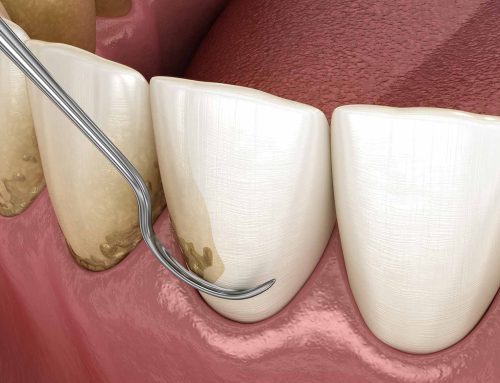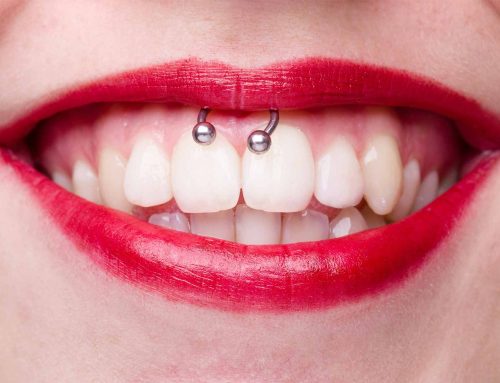What a pleasure it is to warm up with a cup of hot coffee in the winter or cool off with an ice cream in the summer! Except when these seemingly innocuous activities are painful because of sensitive teeth, that is.
If you, like nearly one out of every three adults between the ages of 20 and 50, wince whenever you eat or drink food or beverages that are too hot or too cold, it’s undoubtedly because you suffer from hypersensitive teeth. While this frequent acute pain may be transient, that’s no reason not to examine the problem more carefully. The goal? To discover the possible causes and, more importantly, how to cure it.
Why do our teeth become sensitive? What are the typical symptoms of tooth hypersensitivity to watch for and what can you do to treat the problem? Let’s take a closer look at this common dental complaint.
Symptoms and causes of heat- and cold-induced pain
Tooth hypersensitivity becomes apparent when you consume hot or cold food or beverages, but this isn’t the only time. Acidic foods and even your toothbrush can be powerful triggers. You might confuse the pain with that caused by a cavity. However, in the case of hypersensitive teeth, the condition affects all of the teeth and not just one individual tooth, as in the case of a cavity.
There are numerous causes of tooth hypersensitivity. That’s why it would be impossible for you to diagnose the problem on your own. Only a consultation with your dentist will give you the whole story behind your sensitive teeth. Specifically, the dentin (the “ivory” of the tooth, which is normally protected by the gums and enamel, becomes exposed. Consequently, the nerves of the tooth make direct contact with everything you eat and drink, as well as the air you breathe, resulting in the pain you experience.
What dental conditions or bad brushing habits can lead to damaged enamel, impeding the protection it normally provides for your dentin?
- Periodontal disease: inflammation of the gums (gingivitis) can cause them to recede, exposing part of the root of the tooth. In a case like this, inadequate dental hygiene or an improper brushing technique may be to blame. However, keep in mind that receded gums can also be a natural consequence of aging.
- Improper brushing: in addition to poor technique, this may include using toothpaste that’s too abrasive or a toothbrush whose bristles are too hard.
- Worn teeth: this may be caused by age or by fractures, chips and weakening of the teeth resulting from bruxism (involuntary teeth grinding).
- Overly aggressive tartar removal: along with loose fillings, this can lead to pain, which is fortunately temporary in most cases.
- Acidity: we can’t ignore the fact that certain food and beverages are acidic, which can lead to deterioration of the tooth enamel.
- Infections and severe cavities: you should never neglect serious damage of this type.
- Certain illnesses and conditions: these include pathologies that trigger frequent regurgitation, vomiting and acid reflux, all of which can weaken the dentin. Eating disorders (bulimia, anorexia, etc.), certain chemotherapy treatments and even pregnancy can also be underlying causes of wear and tear on your enamel.
The range of possibilities is undoubtedly greater than you ever imagined. While waiting for the appointment with your dental professional, there’s nothing stopping you from assessing your eating and brushing habits to identify any possible deficiencies. The key to soothing or preventing any pain or discomfort may very well be within reach of your toothbrush
How to soothe and prevent tooth sensitivity
Changes to make in your dental routine
There’s no substitute for a visit to your dentist; however, you should be aware that a few little changes in your eating habits and dental hygiene routine could make a big difference.
- Reduce your consumption foods that are acidic or sugary.
- Switch to a toothbrush with soft bristles. If you use a toothbrush with hard bristles or if you brush too vigorously, you risk damaging your gums.
- Use toothpaste for sensitive teeth and a suitable mouthwash for your particular problem.
- If you suffer from bruxism, there are mouth guards you can use to protect your teeth. Take a moment to talk this over with a healthcare professional.
What your dentist may propose for teeth that are sensitive to heat and cold
Depending on the diagnosis your dentist provides, there are three different categories of medical options:
- Fluoride treatments. With gels, rinses, polishes, toothpastes, mouthwashes and even direct applications, there’s no shortage of solutions for repairing the mineral structure of your enamel.
- Fillings. If your tooth sensitivity is the result of exposed roots, your dentist may recommend placing a resin composite filling around the tooth to fill in the exposed area.
- Gum enhancement. Depending on the severity of your receded gums, your dentist may advise you to use toothpaste designed to strengthen your gums and slow the progression of the disease. Another possibility is a gum graft to restore the gum tissue surgically.
There’s one last solution, which isn’t exactly the most pleasant: devitalization. Used as a last resort in cases of extreme tooth hypersensitivity, this procedure consists of removing the nerves in the affected tooth, thus eliminating any sensation.
Despite the fact that good dental hygiene habits can ease your pain and improve your oral health, you’ll obviously still need to consult your dentist to verify that there isn’t some more serious problem behind the sensitivity of your teeth to heat and cold.
Your dentist can help you alleviate your teeth’s sensitivity to heat and cold
Would you like to feel reassured through compassionate, personalized treatment? The team of Clinique Dentaire Charles Trottier will be happy to provide you with attentive service and advice. Their goal? To provide you with the information you need to take better care of your mouth and, as a result, your overall well-being!





